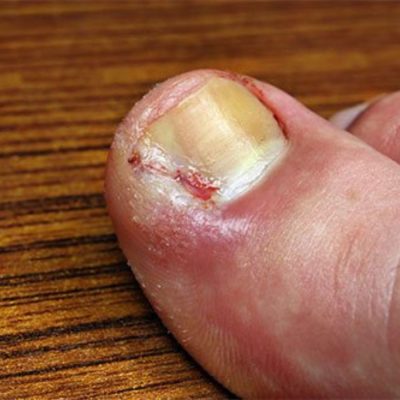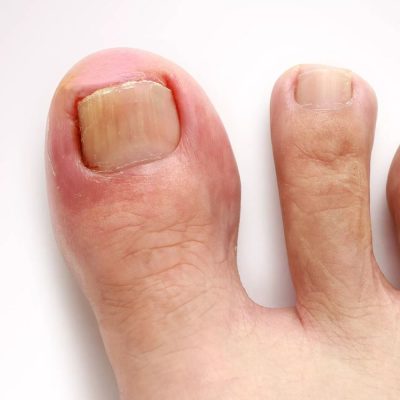Ingrown Toenails
The medical term for an ingrown toenail is Onychocryptosis. It is a common condition where the corner or side of the toenail grows into the soft flesh of the toe. It can lead to pain, swelling and at times get infected. Proper care and timely intervention are essential to alleviate discomfort and prevent complications.

What is an Ingrown Toenail?
An ingrown toenail typically affects the big toe, though it can occur on any toe. It can cause mild discomfort to even severe pain, depending on the severity of the ingrowth. If left untreated, an ingrown toenail can get infected, leading to further complications that may require more intensive treatment.
Symptoms of Ingrown Toenail
Symptoms of an ingrown toenail vary based on the stage and severity of the condition. Some common symptoms include
Pain & Tenderness
The area around the ingrown nail can be painful and tender, especially when pressure is applied.
Redness & Swelling
The skin surrounding the ingrown nail often appears red and swollen.
Infection
An infection could occur in cases where the nail pierces the skin. Signs of infection include increased redness, pus, warmth and a throbbing sensation.
Hardening of the Skin
Due to constant irritation, the skin around the nail could harden and form a callous.
Overgrowth of Skin
In some severe cases, the skin at the edge of the nail may grow over the nail, worsening the ingrowth.
Causes of Ingrown Toenail
There are several factors that can cause an ingrown toenail. Understanding these causes can help in both prevention and treatment.
Cutting nails too short or rounding the edges can cause the nail to grow into the surrounding skin.
Wearing shoes that are too tight or narrow can put pressure on the toes, causing ingrown toenails.
Trauma to the toenail, such as stubbing the toe or dropping something heavy on it, can cause the nail to grow abnormally.
Some people have a genetic tendency to develop ingrown toenails due to the natural shape and curvature of their nails.
Failing to keep feet clean and dry can contribute to the development of ingrown toenails, especially if fungal infections are present.

Diagnosis of Ingrown Toenail
An ingrown toenail is easily diagnosed by a qualified dermatologist. The nail is examined, looking for signs of ingrowth, redness, swelling and infection. Also, a brief patient history inquiring about previous similar incidences, recent trauma to the nail or related conditions can help determine the appropriate treatment.
Management and Treatment of Ingrown Toenail
An ingrown toenail should be treated early to prevent complications and relieve pain. SkinAccess Clinics offers a range of treatment options depending on the severity of your condition.
➥ Home Care:
- Soaking the Foot: Soaking the affected foot in warm water for 15-20 minutes, several times a day, helps to reduce swelling and relieve discomfort.
- Pain Relief: Over-the-counter pain killers can help alleviate some of the discomfort.
➥ Medical Treatments:
- Topical or Oral Antibiotics: Antibiotics may be prescribed to stop the infection and prevent it from spreading.
- Corticosteroid Creams: These are prescribed in cases with severe inflammation and help to reduce swelling and discomfort.
➥ Surgical Intervention:
- Partial Nail Removal / Avulsion: In recurrent or severe cases, the ingrown portion of the nail may need to be removed and the nail bed treated with phenol to prevent regrowth.
- Total Nail Removal: In extreme cases, where the entire nail is affected, the nail may need to be completely removed.
➥ Preventive Measures:
- Proper Nail Trimming: It is essential while trimming to cut the nail straight across and avoid cutting them too short.
- Wearing Proper Footwear: Choosing well fitting shoes will provide adequate room for the toes and help prevent the nails from growing inward.
- Maintaining Good Foot Hygiene: Regularly cleaning and moisturizing the feet along with regular nail care, can help prevent ingrown toenails.
Conclusion
Ingrown toenails can be painful and frustrating, but with proper care and treatment, it is a manageable condition. At SkinAccess Clinics, we offer expert care for ingrown toenails, ranging from conservative home care advice to advanced surgical options. If you are experiencing symptoms of an ingrown toenail, we encourage you to seek professional evaluation and treatment to prevent complications and ensure a quick recovery.
